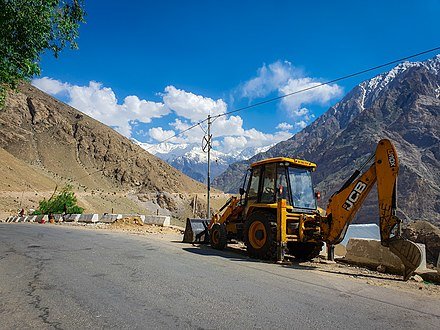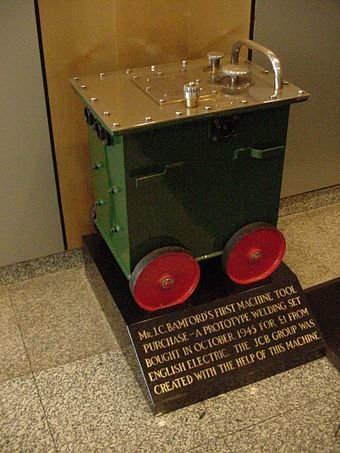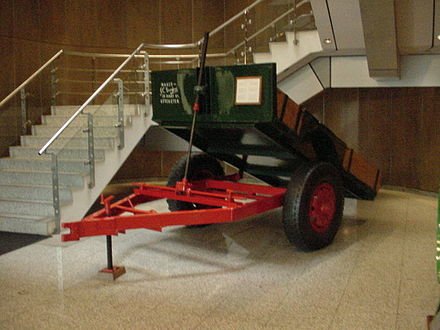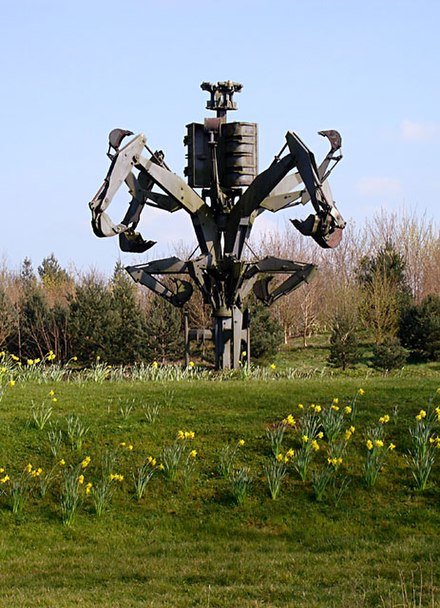British Heritage
Remember, Cherish, Learn.
beta
JCB - Category-defining Construction Equipment
Pioneering Britain's Construction Equipment Industry.
JCB, the British multinational corporation that stands as a bastion of the United Kingdom's manufacturing heritage, has long been synonymous with the design, development, and delivery of construction and agricultural equipment. In a testament to its influence and ubiquity, the term "JCB" has seeped into everyday language to the point where it is used colloquially as a synonym for any mechanical digger or excavator, earning a place in the Oxford English Dictionary.
The story of JCB's success began in 1945, in a small lock-up garage in Uttoxeter, Staffordshire. Joseph Cyril Bamford, the visionary founder of the company that would bear his initials, assembled his first vehicle, a tipping trailer, from war-surplus materials with a second-hand welding set he bought for £2.50. This entrepreneurial spirit would lead to the formation of Joseph Cyril Bamford Excavators Ltd, with the production of versatile, efficient, and innovative construction machinery as its core mandate.
As the company continued to grow and evolve, significant milestones were marked. In 1948, JCB made the first hydraulic tipping trailer in Europe. In 1953, the first backhoe loader, a highly versatile piece of machinery, was introduced to the construction and agricultural industry. Bamford's commitment to innovation was reflected in the company's colour choice: in 1951, JCB products began to be painted yellow, symbolising its vibrant and energetic approach to the industry.
The groundbreaking "hydra-digga" was launched in 1957, merging the functionality of an excavator and loader into a singular multi-purpose tool. By 1964, JCB had sold over 3,000 of its 3C backhoe loaders, confirming its pioneering status in the field of construction equipment. The first 360-degree excavator, the JCB 7, was unveiled the following year, reinforcing the company's position at the forefront of industry innovation.
JCB's influence extended far beyond the British Isles. In 1979, the firm began operations in India, marking the first of many expansions into international territories. JCB's success in India is particularly notable, with the company accounting for three out of every four pieces of construction equipment sold in the country as of 2014. The popularity of JCB in India has even spurred a trend of internet memes, highlighting the cultural impact of the brand.
In the United States, a significant step was taken in 2000 when a JCB factory was established near Savannah, Georgia. Similarly, JCB opened a factory in Brazil in 2001, extending its manufacturing capabilities to South America.
The 21st century saw JCB continue to grow, acquiring the German equipment firm Vibromax in 2005, and opening a new factory in Pudong, China in the same year. The company announced plans to make India its largest manufacturing hub, with its factory in Ballabgarh, Haryana, touted as the future largest backhoe loader manufacturing facility in the world.
JCB has consistently displayed an appetite for innovation, leading to the production of a diverse range of vehicles and equipment. From its seminal backhoe loader to the introduction of the Fastrac range of tractors in 1990, capable of speeds up to 75 km/h, the firm has demonstrated its commitment to evolving with, and often ahead of, industry trends.
In 2006, JCB delved into the realm of high-speed vehicles, announcing the development of the 'JCB Dieselmax'. This diesel-powered land speed record vehicle, equipped with two modified JCB 444 diesel power plants, attained a speed of 350.092 miles per hour, breaking the diesel engine land speed record in 2006.
Despite its success, JCB has not been without controversy. The company was fined by the European Commission in 2000 for violating European Union antitrust law, although portions of the fine were later reduced upon appeal. In 2017, concerns were raised about alleged tax avoidance strategies employed by the firm, while its involvement with the Israeli settlements in the Occupied Palestinian Territories sparked international controversy in 2020.
Despite these challenges, JCB has remained a steadfast contributor to the UK's manufacturing sector. In 2020, it received a £600m loan in emergency financial aid from the UK government, underlining its significance to the UK economy.
JCB and its owners have often been engaged in UK politics. The company left the CBI business lobby group in 2016 due to the organisation's anti-Brexit stance, with chairman Anthony Bamford expressing his pro-Brexit views through substantial donations to the Vote Leave group. JCB and related entities have also been notable donors to the UK Conservative Party.
In the panorama of Britain's industrial heritage, JCB's legacy stands as an emblem of entrepreneurial spirit, technological innovation, and global impact. From its humble beginnings in a lock-up garage, JCB has grown into a global icon, shaping not only the UK's construction industry but also the global landscape of manufacturing and engineering. Its triumphs, challenges, and controversies are woven into the fabric of Britain's industrial history, making JCB a fascinating study in the evolution of British enterprise.
History and Evolution
The story of JCB's success began in 1945, in a small lock-up garage in Uttoxeter, Staffordshire. Joseph Cyril Bamford, the visionary founder of the company that would bear his initials, assembled his first vehicle, a tipping trailer, from war-surplus materials with a second-hand welding set he bought for £2.50. This entrepreneurial spirit would lead to the formation of Joseph Cyril Bamford Excavators Ltd, with the production of versatile, efficient, and innovative construction machinery as its core mandate.
As the company continued to grow and evolve, significant milestones were marked. In 1948, JCB made the first hydraulic tipping trailer in Europe. In 1953, the first backhoe loader, a highly versatile piece of machinery, was introduced to the construction and agricultural industry. Bamford's commitment to innovation was reflected in the company's colour choice: in 1951, JCB products began to be painted yellow, symbolising its vibrant and energetic approach to the industry.
The groundbreaking "hydra-digga" was launched in 1957, merging the functionality of an excavator and loader into a singular multi-purpose tool. By 1964, JCB had sold over 3,000 of its 3C backhoe loaders, confirming its pioneering status in the field of construction equipment. The first 360-degree excavator, the JCB 7, was unveiled the following year, reinforcing the company's position at the forefront of industry innovation.
Global Impact and Expansion
JCB's influence extended far beyond the British Isles. In 1979, the firm began operations in India, marking the first of many expansions into international territories. JCB's success in India is particularly notable, with the company accounting for three out of every four pieces of construction equipment sold in the country as of 2014. The popularity of JCB in India has even spurred a trend of internet memes, highlighting the cultural impact of the brand.
In the United States, a significant step was taken in 2000 when a JCB factory was established near Savannah, Georgia. Similarly, JCB opened a factory in Brazil in 2001, extending its manufacturing capabilities to South America.
The 21st century saw JCB continue to grow, acquiring the German equipment firm Vibromax in 2005, and opening a new factory in Pudong, China in the same year. The company announced plans to make India its largest manufacturing hub, with its factory in Ballabgarh, Haryana, touted as the future largest backhoe loader manufacturing facility in the world.
Product Innovations
JCB has consistently displayed an appetite for innovation, leading to the production of a diverse range of vehicles and equipment. From its seminal backhoe loader to the introduction of the Fastrac range of tractors in 1990, capable of speeds up to 75 km/h, the firm has demonstrated its commitment to evolving with, and often ahead of, industry trends.
In 2006, JCB delved into the realm of high-speed vehicles, announcing the development of the 'JCB Dieselmax'. This diesel-powered land speed record vehicle, equipped with two modified JCB 444 diesel power plants, attained a speed of 350.092 miles per hour, breaking the diesel engine land speed record in 2006.
Challenges and Controversies
Despite its success, JCB has not been without controversy. The company was fined by the European Commission in 2000 for violating European Union antitrust law, although portions of the fine were later reduced upon appeal. In 2017, concerns were raised about alleged tax avoidance strategies employed by the firm, while its involvement with the Israeli settlements in the Occupied Palestinian Territories sparked international controversy in 2020.
Despite these challenges, JCB has remained a steadfast contributor to the UK's manufacturing sector. In 2020, it received a £600m loan in emergency financial aid from the UK government, underlining its significance to the UK economy.
Political Involvement
JCB and its owners have often been engaged in UK politics. The company left the CBI business lobby group in 2016 due to the organisation's anti-Brexit stance, with chairman Anthony Bamford expressing his pro-Brexit views through substantial donations to the Vote Leave group. JCB and related entities have also been notable donors to the UK Conservative Party.
Conclusion
In the panorama of Britain's industrial heritage, JCB's legacy stands as an emblem of entrepreneurial spirit, technological innovation, and global impact. From its humble beginnings in a lock-up garage, JCB has grown into a global icon, shaping not only the UK's construction industry but also the global landscape of manufacturing and engineering. Its triumphs, challenges, and controversies are woven into the fabric of Britain's industrial history, making JCB a fascinating study in the evolution of British enterprise.
- JCB (company)en.wikipedia.org










